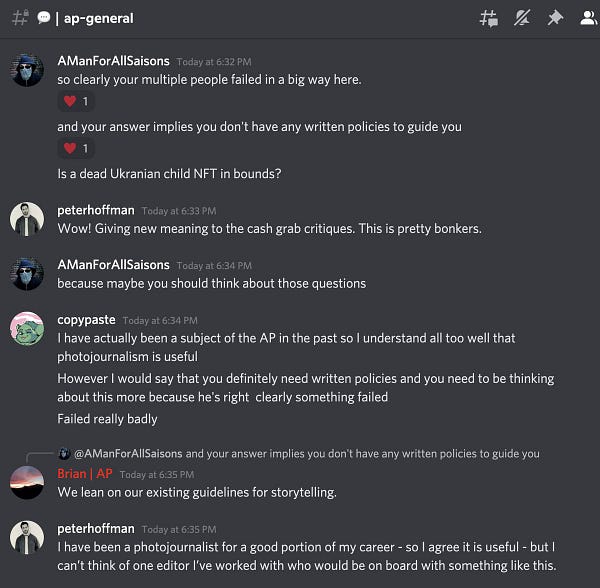Programming note: This is a reminder that we’ll be hitting pause on Slow Build, starting in March. Thanks, as always, for reading.

What it’s like to be experiencing via livestream what’s happening to your country:
"For weeks now, technology has taken over all my waking hours. Everything is online. Misleading pro-Kremlin videos are all over Telegram. TikTok serves up clips of young people in Ukraine explaining what’s going on and videos of military-equipment shipments. The Twitter debates are endless. A Zello channel is always chattering in the background, a kind of citizen radio. The news delivered by this technology has been overwhelming…
The stream of Maidan is different from all the noise. Nothing’s fake here; there’s no algorithm; and once I hide the live chat, there isn’t even a conversation to parse.”
The government of Ukraine is summoning volunteer cybersecurity experts to come to the country’s defense, per Reuters, as part of an emergency effort made necessary because creating an official defensive cyber corps is still on its to-do list:
A Ukrainian security official said earlier this month that the country had no dedicated military cyber force, the Washington Post reported. "It’s our task to create them this year," he told the Washington Post.
That fits into a broader call-to-arms going out to citizens. Case in point: the Ukraine Defense Ministry is using Facebook to tell citizens to prepare Molotov cocktails.
Trying to spread that message via public radio is a bit harder to do, perhaps:


One of the challenges to mounting any sort of active resistance against President Putin and the Russian military? Ukraine’s facing Internet outages, per the Wall Street Journal:
Internet-service provider Triolan said on its website that it suffered outages in a number of areas where it operates, including parts of the capital city, Kyiv. The company said in a later post on Telegram that access in at least two parts of Kyiv had been restored, but that it still was suffering from minor damage in other areas. “Triolan employees are doing everything possible to maintain normal functioning of the network in these difficult times,” the company's Telegram post said.
(By the way, here’s a useful NPR explainer on the spelling and pronunciation of Ukraine’s capital city.)
Resistance-applications aside, the vulnerability of Ukraine’s connectivity is weak point in the country’s otherwise “booming” tech sector.
Speaking of Telegram, this deep dive in Wired by Darren Loucaides a couple weeks back is a fascinating look inside how the app became something of an “anti-Facebook.”
The newest sanctions announced by President Biden include, per the New York Times, restrictions on the country’s import of American-made “semiconductors, computers, lasers and telecommunications equipment.” (Consumer electronics aren’t being targeted, at least not yet.) It might take a while, though, for the pain of that cutting-off to be felt:
[T]he real impact would be on the Russian economy and military capability over time. When electronics, airplanes and ships wear out, Russian entities will find themselves unable to buy new generations of technology.
The New York Times explores whether cryptocurrencies could take some of the wallop out of economic sanctions:
Russian entities are preparing to blunt some of the worst effects by making deals with anyone around the world willing to work with them, experts said. And, they say, those entities can then use digital currencies to bypass the control points that governments rely on — mainly transfers of money by banks — to block deal execution.
Beyond Ukraine
The FDIC’s first chief innovation officer says he quit after just a year because the “federal bureaucracy is both hesitant and hostile to technological change.”
But one fellow former civil servant called bull on that:

The possible creation of a union for congressional employees will be the subject of a House Administration Committee hearing next week, Punchbowl reports: “This will mark the first public effort in the House to allow aides to organize and collectively bargain.”
The AP rethought an NFT sale that included imagery of migrants in boats.
AP staff had questions:




Texas attorney general Ken Paxton — who has fashioned himself a tough antagonist of the tech industry, Google in particular — had looked to be on shaky footing going into his primary. But Politico’s Renuka Rayasam reports from near Austin that “this firework race has sort of fizzled out.” Writes Rayasam, “It turns out it’s not so easy for candidates to convince voters they are more Trumpy than the Trump-backed candidate.”
DuckDuckGo is getting its moment in the sun as the search engine of choice on the hard right.
RightForge is getting its moment in the sun as the hosting platform of choice on the hard right.
And look at the White House trying to capture some of that ‘When’s the State of the Union?’ Google (DuckDuckGo?) traffic:
It’s working!









